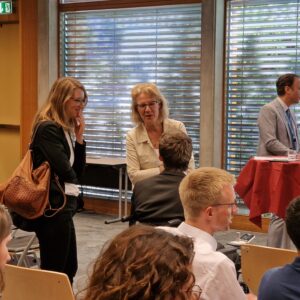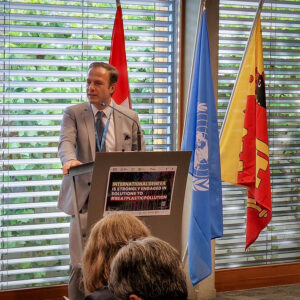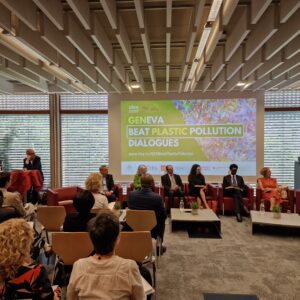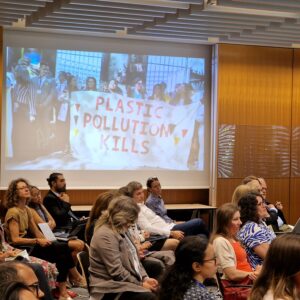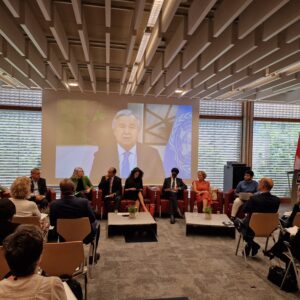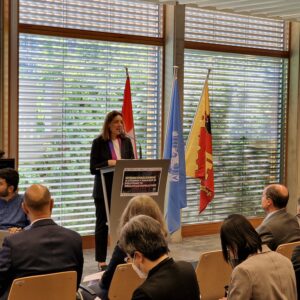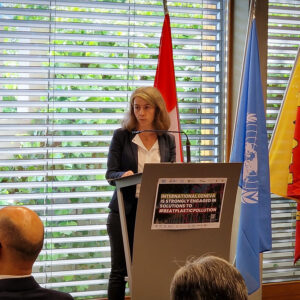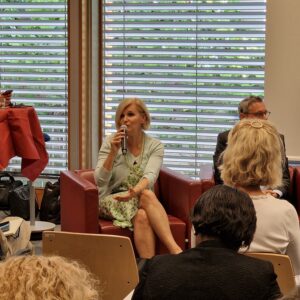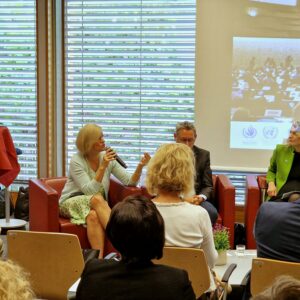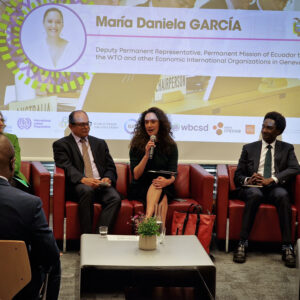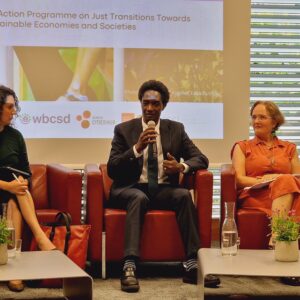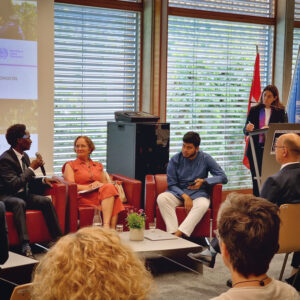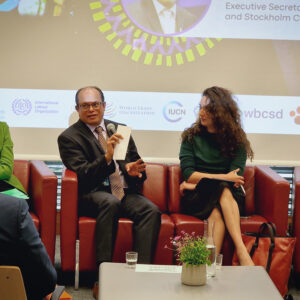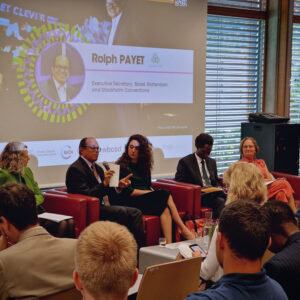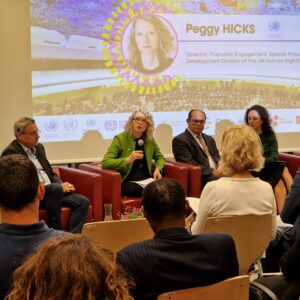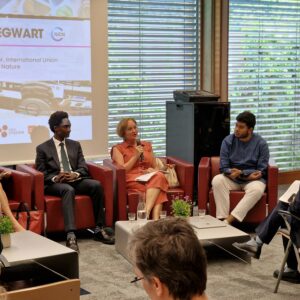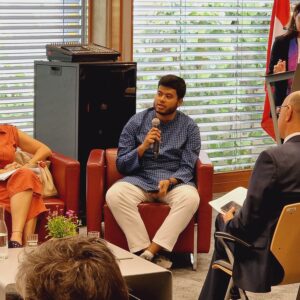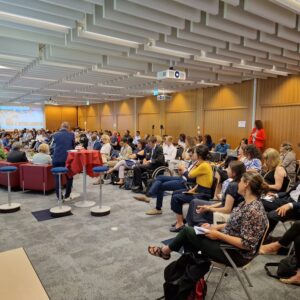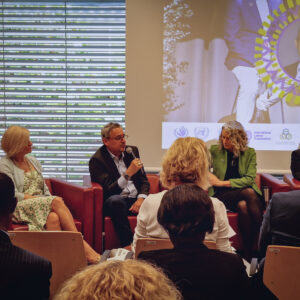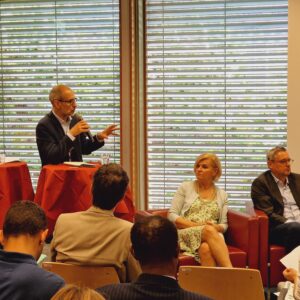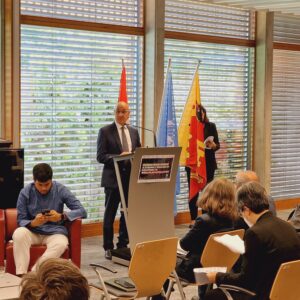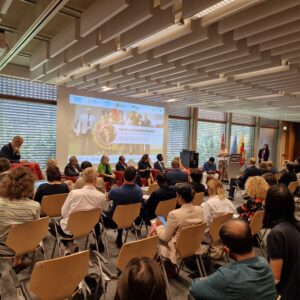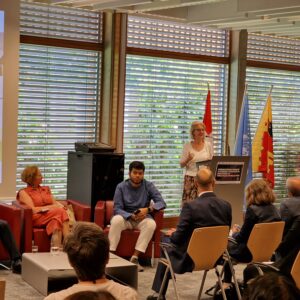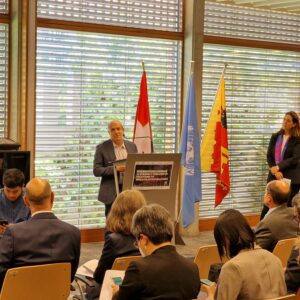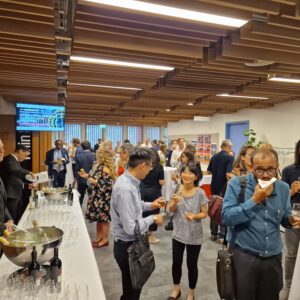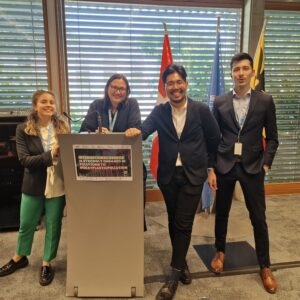Event Conference
World Environment Day Celebration | Multilateral Solutions to Beat Plastic Pollution
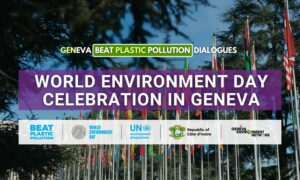
05 Jun 2023
11:00–13:30
Venue: International Environment House II (Chemin de Balexert 7-9, Châtelaine)
This year marks the 50th anniversary of World Environment Day, which focuses on solutions to plastic pollution. This high-level dialogue will highlight the efforts and progress undertaken by actors in Geneva to beat plastic pollution, building on the momentum generated by this World Environment Day in mobilizing transformative action from every corner of the world. The event will be followed by a reception.

About the Celebration
Since its first celebration in 1973, World Environment Day has been an occasion to raise awareness on environmental problems and to call for collaborative action across actors around the world. Fifty years later, the problem of plastic pollution has become a major contributor to the triple planetary crisis of climate change, biodiversity loss and pollution. With more than 430 million tonnes of plastic produced every year worldwide and predictions of annual production reaching up to 1,100 million tonnes by 2050, bold solutions are necessary as currently only a fraction of these is recycled or reused.
Science and solutions to tackle the problem are available, therefore governments, companies and other stakeholders must scale and speed up actions to solve this crisis. At its resumed session of the fifth meeting in March 2022, the United Nations Environment Assembly adopted a landmark resolution to develop a legally binding instrument on plastic pollution, including in the marine environment, with the ambition to complete the negotiations by end of 2024. The second meeting of the Intergovernmental Negotiating Committee (INC-2) will be held in Paris at the end of May 2023. The instrument is to be based on a comprehensive approach that addresses the full life cycle of plastic.
Building on this momentum and on other milestones addressing plastics on the environmental agenda, this World Environment Day is celebrated under the theme ‘Solutions to Plastic Pollution’ serving as an occasion to mobilize transformative action from every corner of the world.
International Geneva is strongly engaged in the agenda to beat plastic pollution. The outcomes of recent negotiations, and the Geneva Beat Plastic Pollution Dialogues that kicked off at the end of 2020, provided some concrete examples of how multilateral Geneva is engaged in finding solutions to address this major crisis, including the BRS COPs, SAICM ICCM5, UNEA-6, and other processes in Geneva, such as at the World Trade Organization, the World Health Assembly, the International Labour Conference, or the Human Rights Council. Held immediately after the end of the INC-2 negotiations in Paris, this celebration will also highlight outcomes from the intergovernmental process and discuss multilateralism and cooperation in action.
Leading diplomats and international experts taking the floor at this event will highlight how international Geneva multilateral diplomacy system, with its numerous intergovernmental organizations, permanent governmental missions, NGOs, platforms, academic institutions, and other stakeholders, is engaged in finding solutions to beat plastic pollution.

World Environment Day 2023
World Environment Day 2023 is hosted by Côte d’Ivoire with the support of the Government of the Netherlands. Both countries are at the forefront to beat plastic pollution, setting the example at the national and international levels. Côte d’Ivoire has banned the use of plastic bags since 2014, supporting a shift to reusable packaging. The country’s largest city, Abidjan, has also become a hub for start-ups looking to beat plastic pollution. The Government of the Netherlands is a member of the High Ambition Coalition calling for a strong and ambitious international legally binding instrument to combat plastic pollution.
In line with the official World Environment Day 2023 Celebration, held this year in Côte d’Ivoire, the Geneva Environment Network is organizing a high-level dialogue to highlight efforts and progress undertaken by actors in Geneva to beat plastic pollution, including through the Geneva Beat Plastic Pollution Dialogues.
The high-level dialogue will be followed by a reception offered by the Swiss Government and local authorities.

Speakers
By order of intervention.

Arnold KREILHUBER
Director, Europe Office, UN Environment Programme

H.E. Amb. Allou Lambert YAO
Deputy Permanent Representative of the Republic of Côte d'Ivoire to the United Nations Office and other international organizations in Geneva, Chargé d'Affaires a.i.

Emmanuelle LACHAUSSÉE
Deputy Permanent Representative of France to the United Nations Office at Geneva and other international organizations in Switzerland

Maria NEIRA
Director, Department of Environment, Climate Change and Health, World Health Organization

María Daniela GARCÍA
Deputy Permanent Representative, Permanent Mission of Ecuador to the WTO and other Economic International Organizations in Geneva

Moustapha Kamal GUEYE
Director, ILO Priority Action Programme on Just Transitions Towards Environmentally Sustainable Economies and Societies

Rolph PAYET
Executive Secretary, Basel, Rotterdam, and Stockholm Conventions

Peggy HICKS
Director of the Thematic Engagement, Special Procedures and Right to Development Division of the UN Human Rights Office (OHCHR)
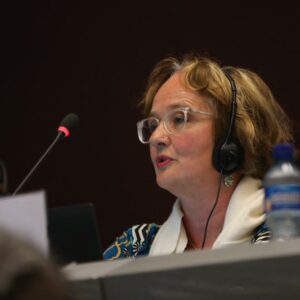
Karine SIEGWART
Senior Policy Advisor, International Union for Conservation of Nature

Zuhair Ahmed KOWSHIK
Global Focal Point, Children and Youth Major Group to UNEP

Dominic WAUGHRAY
Executive Vice President, Imperatives, World Business Council for Sustainable Development

David AZOULAY
Director, Geneva Office and the Environmental Health Program, Center for International Environmental Law

Abdellah BOUTADGHART
Deputy Permanent Representative of the Kingdom of Morocco to the United Nations Office and other international organizations in Geneva

Martine ROHN-BROSSARD
Deputy Head, International Affairs Division, Swiss Federal Office for the Environment
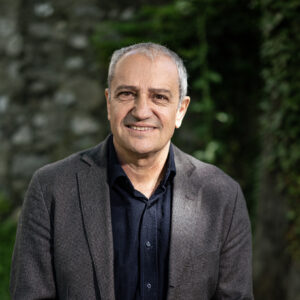
Alfonso GOMEZ
Mayor, City of Geneva

Carolyn DEERE BIRKBECK
Director, Forum on Trade, Environment and the SDGs (TESS) | Moderator
Summary
Opening Remarks
Arnold KREILHUBER | Director, Europe Office, UN Environment Programme
- We are drowning in plastic. The way societies produce, use and dispose of plastic is polluting our ecosystems creating risks for human health and destabilizing our climate.
- The poorest nations and communities suffer the most, as is the case with all aspects of the triple planetary crisis of climate change, biodiversity loss and pollution.
- Science tells us that the current linear plastics economy based on extraction, production and waste is not working. It causes annually billions of dollars in economic costs by destroying infrastructure; impacting energy consumption; tourism; clogging drains; flooding cities and compromising our health by exposure to hazardous chemicals.
- Turning off the Tap on Plastic Pollution, a recent report launched by UNEP shows that we are currently producing over 400 million tons of plastic every year, of which less than 20 percent is recycled, one-third ends up in landfills and the rest ends up right back in the ocean and in the environment.
- Tackling the plastic crisis could be facilitated by the negotiated global deal to end Plastics pollution, to be concluded by the end of 2024.
- At the second session of the Intergovernmental Negotiating Committee to develop an international legally binding instrument on plastic pollution (INC-2), concluded on 2 June 2023, parties agreed on a mandate to prepare a zero-draft of the ILB.
- We need a full life-cycle approach to plastics and to shift to a circular economic model, while ensuring safe disposal of products that are not intended to be circular. This will not easy and will require the support and involvement of all stakeholders, from producers to consumers, to governments and beyond.
- Innovation and ingenuity will be fundamental pillars of a just transition to a new plastics economy, where plastics can continue offering benefits to humanity by keeping it circular and out of the natural world.
- Against this background, this World Environment Day Celebration will highlight how International Geneva and the multilateral diplomacy system is engaged in finding the solutions to beat plastic pollution.
- By taking stock of the outcomes of recent negotiations such as the Plastic Pollution INC, the 2023 Basel Rotterdam and Stockholm Conventions COPs, the 76th World Health Assembly, the upcoming 111th International Labour Conference and the 53rd Human Rights Council, and more, this event embodies the spirit of World Environment Day as an occasion to inform, share and mobilize transformative action from every corner of the world and sector.
- World Environment Day 2023 is hosted by Cote d’Ivoire with the support of the government of the Netherlands. Both countries are at the forefront of efforts to beat plastic pollution, with Cote d’Ivoire being one of the first countries to ban plastic bags back in 2014 and the Netherlands as a member of the High Ambition Coalition to End Plastic Pollution.
H.E. Amb. Allou Lambert YAO | Deputy Permanent Representative of the Republic of Côte d’Ivoire to the United Nations Office and other international organizations in Geneva, Chargé d’Affaires a.i.
- La Côte d’Ivoire est honorée d’être présente à ce dialogue pour la Journée Mondiale de l’Environnement qui se tient aujourd’hui.
- Le thème choisi pour célébrer le 50ᵉ anniversaire de la Journée Mondiale de l’Environnement, solutions a la pollution plastique, vise à sensibiliser les populations sur cet enjeu global et à trouver des solutions pour notre génération et ces futures.
- Le choix de la Côte d’Ivoire et des Pays-Bas par le PNUE est un signal fort pour motiver les autres pays à ses engagés dans la lutte contre la pollution plastique.
- La Côte d’Ivoire est fortement engagée dans la lutte contre la pollution plastique aux niveaux national et international. Elle est partie à plusieurs conventions et traites environnementales.
- Au niveau international, elle est porteuse des résolutions sur les droits de l’homme, la gestion, élimination écologiquement rationnelle des produits et déchets dangereux au Conseil du droit de l’homme.
- Au niveau local, la Côte d’Ivoire a interdit l’utilisation de sacs plastique depuis 2014, soutenant le passage à des emballages réutilisables.
- Dans cette dynamique, la Côte d’Ivoire est active et mobilisée aux initiatives de sensibilisations qui visent à l’élimination de pollution plastique dans le pays. Quelques exemples incluent : les opérations de nettoyage des plages, les tables rondes stratégiques avec les parties africaines sur l’économie circulaire pour le plastique en Afrique, et des séances de sensibilisation dans les écoles et universités.
- Face aux défis environnementaux, on a à disposition la science et une volonté forte des gouvernements, entreprises et des autres partis prenants pour accélérer les actions de lutte et mettre fin à ces cris.
- La Côte d’Ivoire appelle les gouvernements a s’engager fortement et pour la mise en force du traité contraignant sur la plastique.
- La planète est notre unique demeure, nous devons la préserver, protéger pour nous et pour les générations futures.
Video Message from UN Secretary-General António Guterres
Video Message from Inger Andersen, from Côte d’Ivoire
Carolyn DEERE BIRKBECK | Director, Forum on Trade, Environment and the SDGs (TESS) | Moderator
- The aim of today’s roundtable is to celebrate the efforts of all the strands represented on this panel in finding multilateral solutions to plastic pollution.
- Geneva’s multilateralism is so rich that every actor offers a piece of the puzzle in tackling plastic pollution.
- Having a system-wide approach across the UN system and within the wider family of international organizations, as well as engaging a diversity of stakeholders in the effort to end plastic pollution, is the single most effective way to produce the necessary systems change.
- We urgently need a fundamental shift in how, and how much we produce, consume and dispose of plastics. This shift needs to be informed and grounded on the expertise distributed across the international multilateral system.
Multilateral Solutions to Beat Plastic Pollution
Intergovernmental Negotiating Committee to Beat Plastic Pollution: From Paris to Geneva Emmanuelle LACHAUSSÉE | Deputy Permanent Representative of France to the United Nations Office at Geneva and other international organizations in Switzerland
- En remercient la Côte d’Ivoire d’accueillir la 50ᵉ Journée Mondiale de l’Environnement, il faut réfléchir sur l’importance du thème choisi pour cette année : solutions à la pollution plastique.
- Cette pollution est emblématique de notre mode de vie, de production et consommation et notre emprunt sur la planète, la plastique pollue en premier lieu les océans, les littéraux, les rivières, les sols. La faune et la flore en sont asphyxiés.
- À la surface de l’océan pacifique en trouve plus le garbage patch qui s’extende dans une surface trois fois la dimension de la France. À cause des microplastiques présents dans l’air et l’eau, aucun lieu dans la planète est sauf.
- Nous ne devons pas arrêter dans ce cadre alarmant : nous devons agir. L’exemple de la Côte d’Ivoire qui a interdit les sacs plastiques depuis 2014 et son soutien aux initiatives d’économie circulaire pour l’élimination de la plastique doivent nous inspirer.
- En France et en Europe, les objets en plastique à usage unique sont interdits, et nous avons renforcé la responsabilité élargie des producteurs, qui doivent se gérer pour la fin de vie de ces produits.
- L’engagement des pays du G7 pris en avril 2023 pour mettre fin a la pollution plastique renforce cet engagement.
- France was honored to host the second session of the international negotiating committee to end plastic pollution from 29 May to 2 June 2023.
- Despite procedural debates, INC-2 led to fruitful contact groups discussions and work on the treaty’s objectives and scope, including whether the treaty will establish international or national objectives.
- Throughout INC-2 bans on the intentional production of microplastic or on the most problematic and hazardous plastics were encouraged.
- Contact group two’s work on resources and funding, as developing countries called for industrial countries to finance the future treaty. Some favored the creation of a new dedicated fund, while others preferred to call on the global environment facility.
- On June 2nd, a mandate for the zero-draft treaty for consideration at INC-3 in November 2023 in Nairobi was decided, fulfilling France’s main objective for the negotiation.
- We remain determined to ensure that a clear target is set and that the treaty can be drafted in 2024 as planned.
- In the words of Christophe Béchu Minister for Ecological Transition and Cohesion of the Territories, “Discussions must continue non-stop until the November meeting in Kenya so that we can maintain this pressure in the negotiations enabling us to meet this 2024 Target”
Scaling Up Work on Plastics and Health
Maria NEIRA | Director, Department of Environment, Climate Change and Health, World Health Organization
- Knowing that plastic is ubiquitous in the environment is terrible news, but to find it in our bloodstream or organs is worse.
- In the context of the 76th World Health Assembly, a resolution on the health impact of chemicals and waste on health has been tabled. Being tabled by Peru, chair of the INC process, it shows a true example of multilateralism.
- Despite evidence showing the links between plastic pollution and adverse health impacts is necessary, it is important to leverage also the opposite: there is no evidence that having plastics in human bodies has any advantages.
- Options to tackle this issue are numerous, and WHO is committed to playing a critical role to advance action.
- Within the context of environmental negotiations, stakeholders must see the value of involving Ministers of Health when they come to health negotiations as the environment and health are intrinsically linked.
- As a demonstration of the growing awareness of the health dimension of the triple planetary crisis, the first Health Day will be hosted in the context of the Climate Change COP28 this year in the United Arab Emirates.
- If we stop the combustion of fossil fuels, advance measures to mitigate climate change, and halt any type of pollution, including plastic and electronic pollution, we can advance health goals and promote better health for all.
Trade Solutions to Plastic Pollution
María Daniela GARCÍA | Deputy Permanent Representative, Permanent Mission of Ecuador to the WTO and other Economic International Organizations in Geneva
- To see this broad and multilateral engagement to find solutions to plastic pollution is inspiring.
- The World Trade Organization Dialogues on Plastic Pollution was launched in 2019 in collaboration with Australia, Barbados, China, Fiji and Morocco and since then it witnessed an increasing interest and willingness to address plastic pollution.
- Started as an effort from developing countries to address their waste import and the DPP, it now address three work streams:
- Cross-cutting issues: looking at how to bring coherence and engage with other efforts and processes. For instance, the 2021 WTO Ministerial Conference recognized the premises of UNEA resolution 5/14 prior to its approval in March 2022, showing that efforts are taking place in different spaces. Cross-cutting issues also include WTO cooperation with actors such as the BRS Conventions, WHO, IUCN and more.
– Trade solutions can contribute to the global response to plastic pollution through many tools: incentivizing trade; disincentivizing trade, and promoting trade.
– Four percent of global trade is trade in plastics, a figure that does not consider hidden or embedded plastics. WTO is working and collaborating with other entities such as TESS or UNCTAD to improve this transparency about plastic trade and packaging.
– Trade-related policies regard to import and export bans, microplastic packaging regulations and standards, goods and services, as well as safe waste management.
– WTO began works to address trade-related capacity-building and technical assistance by running a survey to understand what is needed from local and domestic contests. This entails technology needs, policy design and so on. - Reducing the production of harmful and unnecessary plastics through enhanced trade for a circular economy.
- Identifying trade tools that can better serve to promote trading goods and services, like technologies for environmentally sound and safe waste management or appropriate cleanup; responding to local development circumstances and needs.
- Reducing financial incentives or subsidies allocated to unnecessary or primary plastics.
- Cross-cutting issues: looking at how to bring coherence and engage with other efforts and processes. For instance, the 2021 WTO Ministerial Conference recognized the premises of UNEA resolution 5/14 prior to its approval in March 2022, showing that efforts are taking place in different spaces. Cross-cutting issues also include WTO cooperation with actors such as the BRS Conventions, WHO, IUCN and more.
- The WTO Dialogues on Plastic Pollution currently count 76 members most of which are developing countries, making it the only one in the WTO where developing countries call developed countries’ members to participate in.
- It is notable that at INC-2 control measures were discussed in terms of a whole life-cycle approach. It is important to understand how these will be effective if we tackle production, use, imports and export, but also the end of life or products.
Just Transition in Plastic Pollution
Moustapha Kamal GUEYE | Director, ILO Priority Action Programme on Just Transitions Towards Environmentally Sustainable Economies and Societies
- Today is an important day for the world of work as we Celebrate World Environment Day and the beginning of the 111th Session of the International Labor Conference.
- At ILC111, the tripartite constituents of the ILO will engage in a general discussion on just transition, including the consideration of industrial policies and technology towards environmental sustainability.
- The shift to environmental sustainability is not just about energy but importantly regards also plastics.
Important messages on the transition from the world of work on the negotiated plastics treaty and the future circular economy for plastics:
- We must get the narrative right by overcoming the idea that strong economic growth, decent work and environmental protection are mutually exclusive. We must clarify that inaction in the face of environmental change is a job killer. The transition to a circular economy for plastic pollution has been demonstrated to have the potential for generating millions of decent jobs, ILO estimates this could generate 80 million jobs by 2030.
- Policy coherence in environmental policies must go hand in hand with economic and social policies. As an estimated 78 million people would need to be re-skilled or up-skilled in the shift to a circular economy in which plastics will be a central component, it is important that this shift takes place in the right consultation with all involved stakeholders.
- The negotiated process is parties-driven. It will have a significant impact on enterprises, workers in the informal economy, and so on. As demonstrated by participating workers at INC-2 last week in Paris, they want to take part in the discussion not as a force of resistance, but as agents of change. We must ensure them the appropriate space.
- A positive narrative requires policy clearance and the engagement of all actors.
Science-based Solutions to Plastic Pollution
Rolph PAYET | Executive Secretary, Basel, Rotterdam, and Stockholm Conventions
- The plastics issue has brought us a long way in working together. When I joined the Secretariat of the BRS Conventions, the conversation was not ripe and justified behind lacking solid scientific evidence. Today, we are witnessing advanced action on this issue from trade, human rights, work, business and more angles.
- Geneva was very responsive to the decision taken at the international level, adapting to decisions such as eliminating single-use plastic in conferences and events.
- Despite switching to a circular plastics economy can be sometimes hard, if we do not lead the change nobody is going to lead it for us. We must adopt policies, strategies, and habits that go beyond our current model of production and consumption.
- At the BRS triple COPs held from 1 to 12 May 2023, negotiations on plastics went on, despite some hesitation on whether to wait on the action to be taken at plastic pollution INC-2 in the following weeks.
- This shows that the work of the BRS Conventions and the plastic pollution INC process are extremely linked and need to continue in parallel.
- Applauding the agreement on a mandate to work on a zero draft, it is important to keep in mind the importance of balancing a global perspective with national-level needs and capacities.
- Intergenerational dialogue and inclusion is also fundamental element to delivering a sustainable transition and ending plastic pollution. Our generation is the one who created this problem we should all work not to pass it on to the next ones.
Main outcomes of the 2023 BRS COPs
- Adoption of the updated guidelines on plastics (UNEP/CHW.16/6/Add.3) after 15 years of rescheduling. Considering the growing interest and relevance of the topic, these will likely continue being updated.
- Stockholm Convention’s listing of two chemicals used as plastics additive: UV-328 (UNEP/POPS/COP.11/14) and Dechlorane Plus (UNEP/POPS/COP.11/13). This marks an important step in making plastic recycling possible and toxic-free.
Human Rights Approach to Beat Plastic Pollution
Peggy HICKS | Director of the Thematic Engagement, Special Procedures and Right to Development Division of the UN Human Rights Office (OHCHR)
- The disturbing impact of plastic pollution infringes on many basic human rights. The right to health, food, water, and sanitation, and the right to a clean, healthy and sustainable environment.
- For far too long plastics have been seen only as a waste problem. Even now when states have the opportunity to agree on a truly ambitious and transformative treaty to end plastic pollution, there are fears that a limited scope focusing on waste and a failure to reduce production and consumption may limit the ambition.
- It is time to realize that plastic pollution threatens our world, lives and rights and to act accordingly addressing plastic pollution not only a waste problem but a human rights crisis.
- This can contribute four distinct advantages:
- Once we recognize that human rights are being violated, we move from a “should” framework to a “must” framework, where states have legal obligations to protect the full range of rights affected by plastic pollution and to build their economies in ways that address unsustainable consumption patterns and encourage consumer choices that are informed by human rights.
- Looking at human rights puts the spotlight on inequalities that are built into this crisis. Plastic pollution hurts those least able to push back the hardest, including indigenous coastal communities, people living in extreme poverty or near production facilities, people with certain medical conditions and children, women, minorities and people of African descent. They often lack the means of recourse to adequately access healthcare information and opportunities to protect themselves from exposure to the hazards and impacts of the plastic cycle and access to remedy.
- Applying a human rights-based approach to addressing the plastic crisis can provide a road map about how to successfully move forward by focusing on key principles such as non-discrimination; transparency; accountability precaution; prevention and intergenerational equity. This means that people, particularly those most affected, have a right to participate in addressing the plastic crisis and that, when they do, we will find better solutions.
- An HR-Based approach guarantees transparency and requires access to information as the foundation for that meaningful participation while ensuring access to justice in environmental matters. It puts people at the heart of decision-making requiring laws, policies and regulations to take account of the cross-cutting impact of plastics on health, aligning inclusive and informed decision-making with scientific evidence and the needs of people in vulnerable situations.
- While working towards a global plastics treaty, we must put in place safeguards to ensure that proposed alternatives are not short-sighted and do not lead to further harm.
- All businesses, including those in the plastic sector, have a responsibility to protect and respect human rights under the UN guiding principles on business and human rights.
- Human rights thinking needs to be applied not only to plastic problems but also to propose solutions and alternatives.
- Technologies fall far short of addressing current plastic waste streams let alone projected increases. Fulfilling the right to a clean healthy and sustainable environment for all requires urgent changes to the production use and disposal of plastics as well as addressing and remediating the impacts of plastics on our physical environment.
Nature-based Solutions to Plastic Pollution
Karine SIEGWART | Senior Policy Advisor, International Union for Conservation of Nature
- Nature-based Solutions per definition are every solution in favor of nature.
- In 2016, IUCN issued a first definition (WCC-2016-Res-069) then taken over by the UN Environment Assembly in 2022 (UNEP/EA.5/Res.5) that defines NbS as “actions to protect, conserve and restore, sustainably use and manage natural or modified terrestrial freshwater, coastal and marine ecosystems”.
- Examples of NbS have been applied and tested under the UNFCCC and also the Convention on Biological Diversity.
- IUCN believes two main NbS exist to fulfill the aim of the negotiated plastic pollution treaty.
- Restoring through nature means that nature can step in to clean up the amount of plastics already present in the environment. For example, mangroves can support ecosystem recovery only after the huge plastic leakage all around the world is cleaned up. NbS for restoring can only come in place when the gravity of the situation is lower.
- Alternatives to plastics coming from nature are nature-based solutions. By supporting the reduction of microplastics in water and in agriculture, NbS like the employment of organic mulch instead of plastics or packaging made out of bamboo can alleviate the crisis.
- We must be aware that nature-based solutions can also have negative consequences on the environment and climate change.
- Only under specific environmental circumstances we could use for example microorganisms consuming plastics, but the scaling so far is not clear.
- When looking at the potential of nature-based solutions to reduce plastic pollution, especially in agriculture, more knowledge and science are needed.
- A whole-of-sectors approach will be necessary to make NbS a real strategy to support ending the plastics crisis.
- A bold plastics treaty must take into account biodiversity and ecosystem aspects as cross-border and cross-cutting issues.
- Nature is circular per se, the plastics treaty must go towards a circular economy that begins and ends in nature. For that, nature-based solutions could be a way to get out of this crisis.
Youth Solutions to Beat Plastic Pollution
Zuhair Ahmed KOWSHIK | Global Focal Point, Children and Youth Major Group to UNEP
- Young people, with their limited resources and access to policy-making are actually bringing a lot of change to the plastic pollution scenario.
- By creating a space for themselves with activism, young people have created a moment of stakeholder engagement, especially with Civil Society Organizations (CSOs).
- Despite current education systems failing from teaching us the skills and information youth needs to position themselves within negotiations, youth has shown the ability to educate themselves through their resourcefulness and peer-to-peer learning.
- Young people actually is the most innovative stakeholder group, generating new solutions and entrepreneurial actions.
- It is through this constituency that indigenous practices and knowledge are being brought back to the attention, providing consolidated pre-plastic era environmental solutions.
- Being more than 50 percent, the youth constituency is a very large consumer group. Youth is also more inclined to adopt an environmentally friendly, despite work to make this easier and scalable is necessary.
- Facilitating and promoting youth-led plastic pollution solutions requires other actors’ action as well.
- Adopting a human rights approach to protect youth and children’s rights to a clean, healthy and sustainable environment against the effects of plastic pollution has not yet been central during INC-2. As stated in the Global Youth Coalition on Plastic Pollution (GYCPP)’s INC-2 closing statement, the rights of nature should be brought into the negotiation and translated into action and policies, and not remain mere written statements.
- Addressing human rights means addressing intergenerational equity which is preserving the right of Children and Youth as decisions taken today affect their present and future lives.
- We demand our expectations and demands to be reflected in the negotiated plastics treaty and for this to have adequate resources and access mechanisms for young people to engage in other environmental fora.
- We know that young people can be entrepreneurs and solutions, but the current entrepreneurship and business environment must be improved.
- Young people need adequate capacity-building opportunities for them to engage meaningfully in decision-making.
- I invite all stakeholders on this panel and beyond to reflect on what they are doing to enable young people to beat plastic pollution.
Corporate Accountability to Beat Plastic Pollution
Dominic WAUGHRAY | Executive Vice President, Imperatives, World Business Council for Sustainable Development
- In the sidelines of INC-2, myself and other colleagues had the pleasure to moderate the multi-stakeholder dialogues held on 27 May 2023.
- Throughout those six hours, over 35 stakeholders from ministries, civil society, youth, science and more addressed various issues, including the business world role in beating plastic pollution, science-based evidence underpinning the negotiation processes; and the need for valid case studies to draw upon.
- The whole-of-economy system change approach relies on circular thinking and must make good use of already-in-place mechanisms such as the Basel Convention for the transboundary movement of secondary materials.
- Many members of the World Business Council for Sustainable Development (WBCSD) are part of the Business Coalition for a Global Plastics Treaty, which is calling for global binding rules. A level playing field that can open up the marketplace for more investment and research and development.
- It is likely that the treaty will include both a cluster of common globally binding rules and national action plans to implement these. The engagement of the leading business voices to identify how those rules will be in place will unlock a lot of investment.
- There currently exist over 60 or 70 different types of schemes for extended producer responsibility (EPR). A common set of standards would be a real unlock for making EPR a common practice.
- The human rights dimension of plastic pollution is of landmark importance in the conversation.
- Corporate accountability is an area that underpins all of this. It is relevant in the climate space, in relation to plastic pollution and more. If and when this treaty is signed, businesses will need to set a target and a transition plan to implement it; report annually on it and regularly disclose progress. The only example where a scheme of this kind exists is the carbon space, with the greenhouse gas protocol.
- To achieve real accountability and transparency, we need to develop globally harmonized disclosure obligations and reporting standards. Through that, hundreds if not millions of businesses can frictionlessly use such a system.
- This will catalyze and speed up the action, providing a concrete way to check businesses’ performances against their various commitments.
Civil Society at the Heart of Solutions to Plastic Pollution
David AZOULAY | Director, Geneva Office and Environmental Health Program, Center for International Environmental Law
- Multilateral efforts have been a multiplier of action toward the premises of the plastic pollution treaty. In this context, the Geneva Beat Plastic Pollution Dialogues pollution played an important role in increasing the linkages between actors.
- The diversity and variety of civil society stakeholders and rights holders reflect the diversity and breadth of the impacts of plastic pollution.
- During the past year, we moved from an understanding of plastic pollution as a plastic waste in the ocean framing to a whole life cycle approach. According to a landmark report by the Organisation for Economic Development (OECD), plastic pollution is “[…] all emissions and risks that arise from the production, use, disposal, and leakage of plastic in the environment.”
- This definition is instrumental in highlighting the variety of communities that are being impacted at every single stage of the life cycle of plastic.
- Plastics is everywhere in the environment and in human bodies, making plastic pollution a cross-cutting issue for all stakeholders.
- Civil society as a diverse group not only has a right to be represented, but it also is essential to provide actual solutions to the crisis.
- Finding solutions that do not aggravate the conditions of the most impoverished or disenfranchised but rather make them part of the solutions should be sought by the international environmental community.
- From very early on civil society has been at the forefront in raising those issues. The reason the global community is now talking about health, the life cycle impacts of plastic and human rights is because those issues have been raised by civil society over the past decades.
- I found myself eight years ago making some of the points made on the panel today and feeling like preaching in the desert. It feels very encouraging and very reassuring to see such distinguished delegates pick up on those points and recognize the relevance of these impacts.
- Civil society has been the conscience of the process and will continue to provide expertise from on the ground from all around the world to achieve the purpose of holding everyone, including ourselves, accountable for how we will meet the challenges to end plastic pollution that were given to us by UNEA .
Multilateral Solutions to Beat Plastic Pollution: From Geneva to UNEA
Abdellah BOUTADGHART | Deputy Permanent Representative of the Kingdom of Morocco to the United Nations Office and other international organizations in Geneva
- The commitment of Morocco in the process to beat plastic pollution is twofold: as chair of the sixth session of the UN Environment Assembly and as a delegation that has always put environmental challenges among its top priorities.
- In its capacity as President of UNEA-6, Morocco is committed to making every efforts to achieve the objectives of resolution 5/14 and ensure the INC process’s success.
- The Moroccan National engagement with the INC process unfolds through a pledge for the protection of human and environmental health from the impacts associated with plastics, and to restrain plastic consumption and production to sustainable levels.
- To deal with this scourge of plastic pollution, Morocco has taken necessary measures to reduce the consumption of plastic, promoting recycling and plastic waste management.
- In this regard, the legal framework has been reinforced by a set of relevant legislation. Law 7715, related to the prohibition of the manufacturer import export marketing and the use of plastic bags.
- Morocco also believes in the promotion and enhancement of cooperation and coordination between countries as well as with the international NGOs to effectively implement the instrument’s measures.
- In the framework of the WTO DPPs, Morocco took part in different discussions since the launch of the dialogue, showing the importance of the trade policy to national and international efforts to tackle plastic pollution. The dialogues are also moving in parallel to the INC-2 process to identify the best way for the plastic trade dimension to be included in the INC process and in general to a circular economy model that respects the climate, the environment, health, and more. Ongoing work towards the potential outcome of the 13th WTO Ministerial Conference (MC13) will take stock of the process and contribute to support it.
- Plastic pollution is a global phenomenon and only by joining all efforts and through international cooperation in all fields and between different actors we can tackle it.
Closing Remarks | Geneva United to Beat Plastic Pollution
Martine ROHN-BROSSARD | Deputy Head, International Affairs Division, Swiss Federal Office for the Environment
- Since the first WED 50 years ago, the priorities of the global environmental community shifted to address issues that became more urgent or pressing.
- It is an honor to have been nominated by UNEP as co-chair, together with Pakistan, of the process for implementing UNEA resolution 5/12, calling upon all stakeholders to align their mining practices and their investments in mining with the 2030 Agenda for Sustainable Development.
- We are increasingly more aware of the negative impacts of plastic on the environment, but it is also clear that the global community is more and more mobilized to combat this challenge.
- Switzerland is very active in this process and is a member of the High Ambition Coalition to End Plastic Pollution. It advocates for a robust treaty with global binding rules.
- This treaty should tackle all aspects of the plastic pollution issue, from reducing the total volume of virgin plastic produced to achieving the objective to end plastic pollution.
Alfonso GOMEZ | Mayor, City of Geneva
- Le plastique est devenu un des principaux facteurs de la pollution planétaire et ça touche les gens, et les puosse à la mobilisation.
- Les villes sont particulièrement concernées par cette problématique. En tant que responsables des plusieurs habitants, les administrations citoyennes ont la responsabilité de promouvoir une consommation et un gestion durables.
- La Ville de Genève travaille depuis plusieures années dans le cadre de notre engagement global en matière de développement durable et plus particulièrement et récemment avec la stratégie climatique que la ville de Genève a élaborée. Cela vise, entre autres, à la diminution de 60% des gaz à effet de serre sur notre territoire d’ici à 2030 et la neutralité carbone que nous souhaitons atteindre en 2050.
- Depuis 2020, la Ville interdit ainsi les objets plastiques à usage unique dans toutes les grandes manifestations organisées par la Ville de Genève ; les buvettes qui sont situées dans le domaine de l’espace public et qui sont soumis à autorisation, ou encore au sein de nôtres administration. Puis parallèlement à ça, la Ville de Genève met en œuvre plusieurs projets et actions non seulement de sensibilisation afin de promouvoir l’économie circulaire, mais surtout de réduire l’impact environnemental et social de la consommation.
- La Ville et le Canton de Genève, et aussi la Suisse, ont un rôle important parce que la production de déchets plastiques est liée au pouvoir d’achat. La Suisse produit 90 kilos de déchets plastiques chaque année par personne et évidemment cela a un lien avec la richesse et notre niveau de consommation.
- Nos objectifs ce n’est pas seulement de mieux jeter ou recycler, mais aussi de travailler sur la consommation responsable et la production de déchets avec l’idée centrale que les meilleurs déchets sont ceux qui ne sont pas produits.
- L’engagement de Genève internationale sur cette thématique peut jouer un rôle de premier plan dans la résolution de la crise plastique. La Genève internationale compte un fabuleux réseau d’expertise, d’organisations, des missions gouvernementale permanente, ONGs et d’institutions académique qui sont très actifs dans le domaine.
- Alors que se négocie actuellement le traité mondial contre la pollution plastique que l’on peut considérer comme un des textes contraignants parmi les plus importants pour notre planète depuis de nombreuses années, je ne doute pas que la partie décisive de la Genève internationale dans les discussions en cours sera primordiale.
- Dans le cadre de cette négociation, je voudrais également appeler les gouvernements nationaux à consulter leurs collectivités locales et régionales afin qu’on puisse s’assurer que ce traité va refléter de manière adéquate les préoccupations des villes et qu’il pourra être mis en œuvre de manière réaliste.
- Un des objectifs de mon année de mairie, c’est de réunir les maires des grandes villes pour voir quelles sont les mesures qui aujourd’hui sont prises.
- Nous avons pris toute une série de résolutions depuis de nombreuses années mais aujourd’hui, il ne s’agit pas seulement de prendre ces résolutions mais de savoir concrètement quels sont les pas que nous avons fait. Nous ne pouvons pas attendre 2029 pour constater que nous n’allons pas atteindre les objectifs de 2030. C’est aujourd’hui déjà que nous devons dire concrètement ce que nous avons fait et quels sont les progrès en la matière.
- Il s’agit donc d’une revendication pour moi importante et également par le Geneva Cities Hub, qui a été créé en 2020 par la ville de Genève et le canton de Genève avec le soutien de la Confédération Suisse. Son but est de renforcer le rôle des villes, de renforcer le pouvoir des gouvernements locaux et régionaux en la matière, et surtout de pouvoir participer dans ces discussions nationales qui ont eu lieu ici à Genève pour pouvoir démontrer ce que nous faisons concrètement et que cette lutte est évidemment possible d’être mené avec les objectifs ambitieux que nous nous sommes fixés pour 2030.
- Le Geneva Cities Hub a appelé à l’inclusion de représentants municipaux dans les travaux du comité intergouvernemental de négociation ainsi que l’inscription d’une référence dans le texte au rôle joué par ces gouvernements locaux par les villes dans la prévention et dans la lutte contre la pollution plastique.
- J’espère que ces revendications importantes seront entendues. Elle est primordiale puisque les villes, les communes, les gouvernements régionaux sont la première étape entre la citoyenneté, évidemment qui est indispensable dans cette mobilisation que nous devons aujourd’hui plus que jamais renforcer.
RECEPTION
Highlights
Video
Photos Gallery
Links
- World Environment Day Official Website
- World Environment Day in Geneva
- Addressing the Plastic Crisis from Geneva | Plastics and the Environment Series
- Plastics and the Environment
- We can beat plastic pollution as millions demand change, says UNEP Executive Director
- World Environment Day brings solutions to plastic pollution into focus | UNEP Press Release
- IUCN Director General’s Statement for World Environment Day 2023
- Beat Plastic Pollution Practical Guide | UNEP
- Our Planet is Choking on Plastics | UNEP
- Solutions to Beat Plastic Pollution (Speech) | Inger Andersen | 16 May 2023
- Quiz: How much do you know about the plastic pollution crisis? | UNEP

